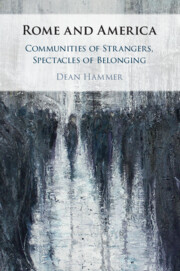Book contents
- Rome and America
- Rome and America
- Copyright page
- Dedication
- Contents
- Figures
- Preface
- Introduction
- Chapter 1 Memory, Identity, and Violence
- Chapter 2 Imagining Purity
- Chapter 3 The Wild Stranger and the Conquest of Space
- Chapter 4 Playing Culture
- Chapter 5 The Experience of Politics and the Crises of Two Republics
- Select Bibliography
- Index
Chapter 1 - Memory, Identity, and Violence
Founding in the Aeneid and The Outlaw Josey Wales
Published online by Cambridge University Press: 22 December 2022
- Rome and America
- Rome and America
- Copyright page
- Dedication
- Contents
- Figures
- Preface
- Introduction
- Chapter 1 Memory, Identity, and Violence
- Chapter 2 Imagining Purity
- Chapter 3 The Wild Stranger and the Conquest of Space
- Chapter 4 Playing Culture
- Chapter 5 The Experience of Politics and the Crises of Two Republics
- Select Bibliography
- Index
Summary
The chapter looks at Virgil’s Aeneid and the American Western The Outlaw Josey Wales to identify a Roman and American shared founding narrative of a community of Strangers dislocated from history and place. What emerges from Virgil, and gives us insight into America’s founding experience, is that the connection between past and future hinges on a paradox. The community is defined neither by a lineage of a people nor by a place, but is forged by the experience of dislocation. The sense of a future, which for both Rome and America lie in the promise of a new age, does not rest on a continuity with the past but on the experience of discontinuity. The power of these narratives is that they provide a basis for the incorporation of new peoples and new territory. But the myth haunts the Roman imagination like it does the American. If there is nothing natural, fixed, or visible about who is included as Roman or American, then it is not clear what constitutes a We rather than a They.
Keywords
- Type
- Chapter
- Information
- Rome and AmericaCommunities of Strangers, Spectacles of Belonging, pp. 16 - 57Publisher: Cambridge University PressPrint publication year: 2023

